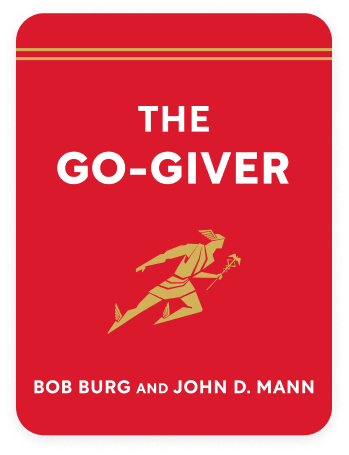

This article is an excerpt from the Shortform book guide to "The Go-Giver" by Bob Burg and John D. Mann. Shortform has the world's best summaries and analyses of books you should be reading.
Like this article? Sign up for a free trial here .
Are you looking for The Go-Giver discussion questions? How can these exercises help you to better understand the Five Laws of Stratospheric Success?
These The Go-Giver discussion questions relate to the Five Laws of Stratospheric Success. Those laws are value, compensation, influence, authenticity, and receptivity.
Keep reading for The Go-Giver discussion questions from the book.
The Go-Giver Discussion Questions
In our society, we admire success-oriented people, or go-getters. But in The Go-Giver, authors Bob Burg and John David Mann turn that idea on its head. They argue that you should make giving rather than getting your first priority in business and in life—and success will follow.
In the form of a business parable in which a mentor puts a frustrated go-getter on the path to success and fulfillment, the authors explain why and how you can change from being a go-getter to a go-giver by practicing the Five Laws of Stratospheric Success.
Below are The Go-Giver discussion questions to help improve your understanding of the book.
Giving Value
The first of The Go-Giver discussion questions has to do with The Law of Value. The authors of The Go-Giver contend that you should make giving rather than getting your first priority in business and in life—and success will follow. The first principle in adopting a giving approach is to give more in value than you get in payment.
- Can you think of an experience—for instance, a business or personal transaction—in which you received more than you paid for or gave in return? What was the experience and how did it make you feel?
- How did it impact your next interaction with the business or person?
- What’s a way that you can add value for someone this week? How can you increase that value beyond any payment or return you might get?
Enlarging the Number You Serve
In the book, the Law of Compensation states that your income depends on how many you serve and how well you serve them—in other words, on your impact. You can increase your income and success by finding ways to serve more people.
- Think of an aspect of your work or personal life in which you serve others—for instance, helping customers or working with the PTA at your children’s school. How would you describe the impact you’re making?
- What’s a way to leverage your efforts or enlarge the number of people you serve? If you can’t think of a way, is there something else you could do with greater potential impact? (Remember that how well you serve is also part of the impact formula.)
- What’s the upside of serving for you? Why do you do it? How would enlarging the number of people you serve increase the “returns” you get?
Stop Keeping Score
The third set of The Go-Giver discussion questions has to do with The Law of Influence. In the business and political worlds, people often do favors with the expectation that others will return the favors. They keep track of who “owes” them. But the Law of Influence calls for totally putting others’ interests first while trusting that your interests will be taken care of in the process.
- Think of a relationship you have where you don’t keep score but give freely without expecting reciprocation. How does that relationship compare to a relationship where you keep score?
- What would it be like to have that kind of selfless relationship with everyone in your life—family, friends, coworkers, strangers?
- What would it take to make that happen?
Be Authentic
The Law of Authenticity states that the most important thing you can offer is yourself. Applied to a business environment, it means that when you sell a product or service, you’re selling yourself. If you put on an act instead of being authentic, you’ll fail.
- Think of an instance where you played a role or acted in a certain way because it was expected. What kind of response did you get? How did it make you feel?
- How would the situation have been different had you acted authentically? What value could you have added by being yourself?
- How much of your time do you spend playing a role that isn’t the real you? How can you reduce that time and be more authentic overall?
Receptivity
The final set of The Go-Giver discussion questions relates to receiving. The Law of Receptivity states that for your giving to be effective or create the success you want, you also have to open to receiving. Giving and receiving go together like inhaling and exhaling—one isn’t effective without the other.
- Think of a situation in your work or personal life that involved both giving and receiving. How did they complement each other?
- Think of a time when you had difficulty receiving something. Why was it difficult? What did you do?
- The next time someone gives you something—for instance, a ride, change for a vending machine, or help with a problem—instead of thinking immediately of what you owe in return, how can you react differently, in a spirit of receptivity?

———End of Preview———
Like what you just read? Read the rest of the world's best book summary and analysis of Bob Burg and John D. Mann's "The Go-Giver" at Shortform .
Here's what you'll find in our full The Go-Giver summary :
- Why giving will take you further than getting
- The Five Laws of Stratospheric Success
- How giving isn't the same thing as always being nice






